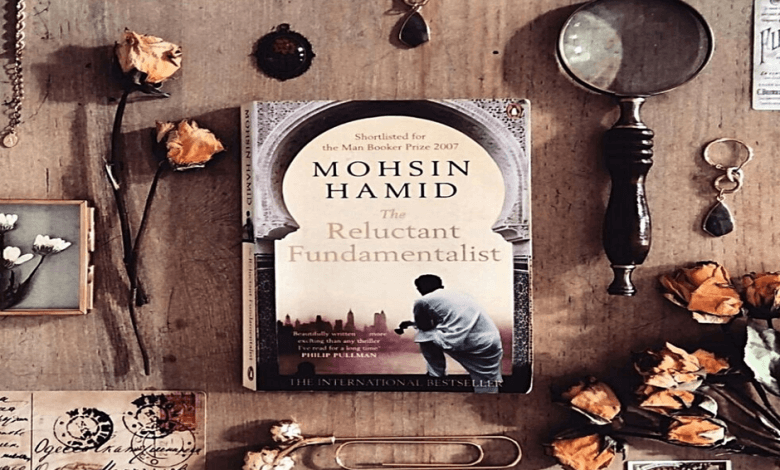
The Reluctant Fundamentalist is a novel by Pakistani author Mohsin Hamid, published in 2007. The novel is a monologue delivered by a Pakistani man named Changez to an American tourist in a café in Lahore.
Detailed Summary of Reluctant Fundamentalist:
Chapter 1:
The novel opens with Changez, a young Pakistani man, meeting an American stranger in a café in Lahore, Pakistan. Changez invites the stranger to join him for tea, and they engage in conversation. Changez addresses the stranger as “Sir” and is initially polite and respectful, but as the conversation progresses, he becomes more assertive and confident.
Changez offers to tell American tourist his life story, saying that he hopes to “dispel the misunderstanding that exists between us.” He begins by describing his childhood in Lahore and his family’s background, highlighting the importance of education and hard work in his upbringing.
Chapter 2:
Changez continues his story by describing his experience studying at Princeton University on a scholarship. He is grateful for the opportunity to attend such a prestigious institution, but he struggles to fit in with the wealthy, predominantly white student body.
Changez describes feeling like an outsider and being acutely aware of his Pakistani identity. He shares his attempts to assimilate by adopting American customs and accents, but he ultimately realizes that he will never be fully accepted into the culture.
Despite the difficulties he faces, Changez excels academically and is eventually offered a job at a top valuation firm in New York City. The chapter establishes the tension between Changez’s desire for success in America and his sense of alienation from the dominant culture.
Chapter 3:
After graduation, Changez lands a prestigious job at a valuation firm in New York City. He is initially enamoured with American culture and the promise of the American Dream.

Chapter 4:
Changez begins dating Erica, a beautiful and wealthy young woman from a prominent family. Their relationship is complicated by Erica’s grief over the death of her childhood friend, Chris.
Chapter 5:
Changez’s job becomes more demanding and stressful, and he begins to feel like an outsider in his workplace. He also experiences increased scrutiny and discrimination due to his Pakistani identity.
Chapter 6:
After the September 11 attacks, Changez’s life changes dramatically. He is subjected to even more racism and suspicion, and his company is hired to value companies that manufacture weapons and military technology.
Chapter 7:
Changez travels to Greece on a business trip and experiences a profound shift in his perspective. He becomes more critical of American culture and foreign policy, and begins to identify more strongly with his Pakistani roots.
Chapter 8:
Changez returns to New York and quits his job. He begins teaching at a university in Lahore and becomes involved in anti-American protests.
Chapter 9:
American tourist interrupts Changez’s story and accuses him of being a terrorist. Changez denies this and insists that he is simply a man who has become disillusioned with America.
Chapter 10:
The novel ends with American tourist leaving the café and Changez walking away, his fate uncertain. The ending leaves the reader to ponder the implications of Changez’s story and the relationship between America and the Muslim world.
Things Fall Apart Summary and Major Themes
Ending of the Novel Reluctant Fundamentalist:

The ending of “The Reluctant Fundamentalist” is deliberately open-ended, leaving readers to draw their own conclusions about Changez’s fate and the larger themes of the novel. The final scene shows Sir, the American stranger whom Changez has been telling his story, leaving the café without any indication of what he thinks about Changez’s tale. Changez himself is left walking away from the café, his future uncertain.
One possible interpretation of the ending is that Changez’s story has made an impact on Sir, forcing him to confront the negative consequences of American policies towards the Muslim world. Sir’s silence and departure suggest that he may be grappling with the implications of Changez’s narrative, possibly questioning his own assumptions about the world and his place in it.
Another interpretation is that Changez’s fate is left ambiguous to emphasize the larger theme of the novel, which is the complex relationship between America and the Muslim world. The novel explores how cultural misunderstandings, economic disparities, and political conflicts can create tensions and even violence between the two cultures. By leaving Changez’s future uncertain, the novel invites readers to reflect on the broader issues at play and to consider what might happen if these tensions are not addressed.
Ultimately, the ending of “The Reluctant Fundamentalist” is designed to be thought-provoking and open to interpretation. By leaving readers to draw their own conclusions, the novel encourages them to engage with its themes in a personal and meaningful way.
Our Lady of Alice Bhatti By M Hanif Summary and IMP Themes
Major Themes in Reluctant Fundamentalist:
There are several major themes in “The Reluctant Fundamentalist” by Mohsin Hamid. Some of them are;
Identity Crisis:

Changez’s struggle with identity is a central theme in “The Reluctant Fundamentalist.” As a Pakistani living and working in America, he faces a number of challenges that force him to examine and question his identity. He feels torn between his Pakistani roots and his American experiences, and he is never quite able to reconcile the two.
For example, when he returns home to Lahore, he is initially viewed with suspicion by his old friends and colleagues because of his time in America. They see him as having been corrupted by Western values, and they are hesitant to trust him. Conversely, when he is in America, he faces discrimination and suspicion because of his Pakistani background and his Muslim faith.
Throughout the novel, Changez’s identity is in flux, as he grapples with questions of culture, religion, and nationality. He is torn between his loyalty to his home country and his desire for success and acceptance in America. Ultimately, he must choose where his true identity lies, and this decision has profound consequences for his life and his relationships.
Prejudice and discrimination:
Another major theme in “The Reluctant Fundamentalist” is prejudice and discrimination, particularly in the aftermath of the 9/11 attacks. Changez experiences discrimination in America because of his Pakistani background and Muslim faith. He is subjected to racial profiling, suspicion, and hostility, even though he has no connection to the terrorists responsible for the attacks.
At the same time, Changez is also forced to confront his own prejudices towards Americans. He initially views them as naive and arrogant, and he is critical of their materialistic culture and foreign policy. However, as he becomes more involved in anti-American activism, he also becomes more radical in his views, and his prejudices begin to cloud his judgment.
The novel raises important questions about the nature of prejudice and the impact it can have on individuals and communities. It also underscores the importance of empathy and understanding in overcoming prejudice and building bridges between different cultures and backgrounds.
Corporate greed:

Corporate greed is another major theme in “The Reluctant Fundamentalist.” Changez works for a prestigious financial firm, Underwood Samson, and initially enjoys the fast-paced lifestyle and opportunities for success that come with it. However, he becomes increasingly disillusioned with the corporate world and its values.
As Changez observes the impact of corporate greed on individuals and communities, he becomes increasingly critical of the financial industry and the way it values profit over people. He questions the morality of his work, and he eventually quits his job at Underwood Samson in order to pursue a more meaningful and fulfilling life.
The novel critiques the values of capitalism and the corporate world, highlighting the human cost of the pursuit of profit. It also suggests that there are alternative ways of living and working that are more aligned with ethical and moral principles, and that these alternatives can provide greater fulfilment and meaning in life.
Perspective and perception:
The theme of perspective and perception is also significant in “The Reluctant Fundamentalist.” The novel is framed as a monologue delivered by Changez to an unnamed American tourist in a café in Lahore. Through his monologue, Changez presents his perspective on his life and experiences, as well as his views on American culture, politics, and foreign policy.
However, the novel also raises questions about the reliability of perception and the way that individuals perceive and interpret events differently. The American tourist’s reactions to Changez’s monologue are not explicitly revealed, and the reader is left to infer her thoughts and feelings based on the context and the details provided.
Additionally, the novel suggests that our perceptions of others are often shaped by our own biases and prejudices. Changez himself struggles to overcome his prejudices towards Americans and to view them with empathy and understanding, just as the American tourist may be influenced by her own preconceptions about Pakistan and its people.
Through its exploration of perspective and perception, the novel encourages readers to consider the complexity of human experiences and to approach others with empathy and openness.
Politics and activism:
The novel explores the role of politics and activism in society. Changez becomes involved in anti-American activism after returning to Lahore, and the novel raises questions about the effectiveness and consequences of political activism.
Conclusion
The Reluctant Fundamentalists as a postcolonial novel (postmodern) explores the theme of Identity crises in the context of Indo-pak.
It further illustrates the typical mindset that British Colonization has left in South Asia. Overall, it is a nice novel if a person has interests in postcolonial literature and creates a deeper understanding about the relationship between the colonizers and colonized.
Nawabdin Electrician Summary and Analysis by Daniyal Mueenuddin



